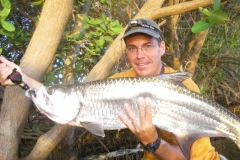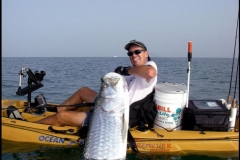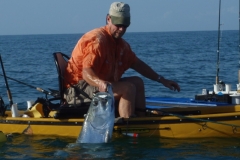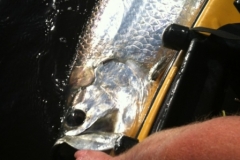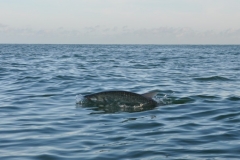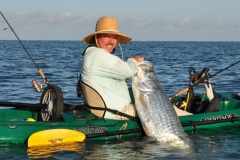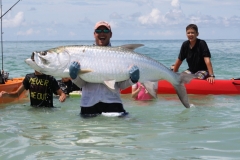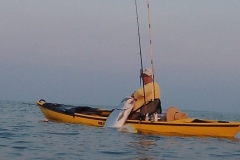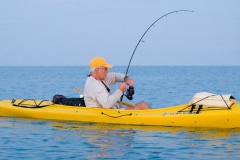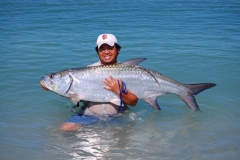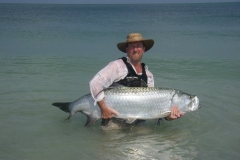Paddle-Fishing.com Tournament Series

The Paddle-Fishing.com Tournament Series (PFTS) is the longest running paddle fishing series in the State of Florida. The PFTS was born in the Tampa Bay area 7 years ago by two guys that wanted to start a catch/photo/release paddle fishing tournament series that were low cost, very competitive and most of all FUN. The home for they chose for this series was Paddle-Fishing.com
The original series were termed One Lure Challenges (OLC). Erick Bell, formerly with Folsom Products, started the OLC’s as tournaments with limited boundaries where the anglers could only use the lure chosen by the tournament director. It created a very level playing field.
After four successful years of running the OLC an employment opportunity took Erick to North Carolina. In his absence, Todd Llewellyn started the PFTS to continue the series with the same premise of a low cost, limited boundaries tournament series that created a level playing field for all the participants to have a good time. This next season, 2010 – 2011, will be our fourth year running for the PFTS.
Over the past three years we have had a running average of 55 anglers per event. Over the past three seasons, over 150 different anglers have competed in at least one event. Our events are all low cost, $10, and limit the anglers to the lures they can use and the boundaries they can launch from. The top three anglers for each event split 100% of the tournament entry fees with 50% going to first place, 30% to second and 20% to third. The tournament director keeps none of the cash paid in. Other donated prizes from sponsors and friends of the PFTS are awarded, as we have them, to largest fish, most spots, etc.
In the 2010 – 2011 series, we will have a series long contest that tracks the total inches of one of each of the slam fish (sea trout, redfish & snook) for each event per angler. The angler with the largest total inches at the end will be named the PFTS Angler of the Year. We will have a 1st, 2nd and 3rd place prize in the PFTS Angler of the Year competition.

PFTS #2 – The Mystery Lure – October 23, 2010 Results
The second event in the Paddle-Fishing.com Tournament Series (PFTS) is completed.
Read more…..
PFTS #1 – Dynamic Duo – Sept 11, 2010 Results
The first event in the PFTS was held September 11, 2010 along the south shore of Tampa Bay. The rules for this event were simple – each angler was allowed to bring two fishing rods each rigged with one lure of their choice. That’s it.
We had a beautiful but warm day and 48 anglers showed up to compete. The Pic n’ Sip was held at The Docks Restaurant in Apollo Beach and, as usual, they were gracious hosts.
Seven Habits of How to be an Effective Fisherman
Seven Habits of How to be an Effective Fisherman
By Jay Brewington
Are you an effective fisherman? What does make the difference between fishing and catching? Over the years, I have had the good fortune to fish with some excellent anglers. Some of them were professionals. Most of them were just enthusiasts like the rest of us.
All of them have had the following habits in common.
- Every trip should be a learning experience. Even if it is just determining why you had a good or bad day on the water, take something away from the trip. In addition, you might learn how to use a new lure or a different technique for something already in your tackle box.
- Fish with tackle that is as light as reasonably possible. The largest jig head I have ever seen any good flats angler use is a ¼ ounce. Most of them use 1/8 or 1/16 ounce heads. Light lures and lines allow for a more natural presentation of your lure.
- Learn how to use a select number lures well. The successful fishermen I have watched are not lure junkies. Their arsenal includes one or two lures that cover each area of the water column. They might change colors, but they don’t change lures. This doesn’t mean you shouldn’t try new lures. Just figure out how you want to work it into your repertoire.
- Learn one or two fishing venues like the back of your hand. You should know the location every pothole, oyster bar, and the outlet for those areas. Learn exactly which conditions create the best chance for success for those areas. Many expert fishermen are only experts on their home waters.
- Keep a log of your fishing trips. You might write it down in a diary or set up some fancy database on the computer but keep a record of your successes and failures. Make a note of tide, weather, and moon phase. Record what you caught and how you caught them. If you caught fish in a certain area on a high tide around the full moon of July, chances are that might be a good place to go next year at the same time.
- Watch what is going on around you. Look for diving birds. See if you can find pods of baitfish. If you are looking for redfish, see if you can find mudding mullet. The environment can provide you with a wealth of information.
- Listen to and watch others. If you are lucky enough to go on a fishing trip with someone you think is a good angler, pick his or her brain. Don’t spend a lot of time telling someone why what you do is best. Learn their techniques for a successful day on the water.


